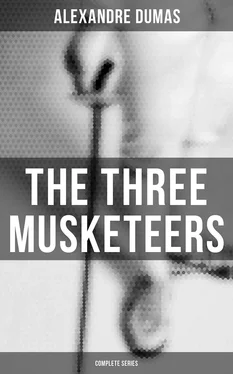Athos shrugged his shoulders, and followed his guards silently, while M. Bonacieux uttered lamentations enough to break the heart of a tiger.
They locked the mercer in the same dungeon where he had passed the night, and left him to himself during the day. Bonacieux wept all day, like a true mercer, not being at all a military man, as he himself informed us. In the evening, about nine o’clock, at the moment he had made up his mind to go to bed, he heard steps in his corridor. These steps drew near to his dungeon, the door was thrown open, and the guards appeared.
“Follow me,” said an officer, who came up behind the guards.
“Follow you!” cried Bonacieux, “follow you at this hour! Where, my God?”
“Where we have orders to lead you.”
“But that is not an answer.”
“It is, nevertheless, the only one we can give.”
“Ah, my God, my God!” murmured the poor mercer, “now, indeed, I am lost!” And he followed the guards who came for him, mechanically and without resistance.
He passed along the same corridor as before, crossed one court, then a second side of a building; at length, at the gate of the entrance court he found a carriage surrounded by four guards on horseback. They made him enter this carriage, the officer placed himself by his side, the door was locked, and they were left in a rolling prison. The carriage was put in motion as slowly as a funeral car. Through the closely fastened windows the prisoner could perceive the houses and the pavement, that was all; but, true Parisian as he was, Bonacieux could recognize every street by the milestones, the signs, and the lamps. At the moment of arriving at St. Paul—the spot where such as were condemned at the Bastille were executed—he was near fainting and crossed himself twice. He thought the carriage was about to stop there. The carriage, however, passed on.
Farther on, a still greater terror seized him on passing by the cemetery of St. Jean, where state criminals were buried. One thing, however, reassured him; he remembered that before they were buried their heads were generally cut off, and he felt that his head was still on his shoulders. But when he saw the carriage take the way to La Greve, when he perceived the pointed roof of the Hotel de Ville, and the carriage passed under the arcade, he believed it was over with him. He wished to confess to the officer, and upon his refusal, uttered such pitiable cries that the officer told him that if he continued to deafen him thus, he should put a gag in his mouth.
This measure somewhat reassured Bonacieux. If they meant to execute him at La Greve, it could scarcely be worth while to gag him, as they had nearly reached the place of execution. Indeed, the carriage crossed the fatal spot without stopping. There remained, then, no other place to fear but the Traitor’s Cross; the carriage was taking the direct road to it.
This time there was no longer any doubt; it was at the Traitor’s Cross that lesser criminals were executed. Bonacieux had flattered himself in believing himself worthy of St. Paul or of the Place de Greve; it was at the Traitor’s Cross that his journey and his destiny were about to end! He could not yet see that dreadful cross, but he felt somehow as if it were coming to meet him. When he was within twenty paces of it, he heard a noise of people and the carriage stopped. This was more than poor Bonacieux could endure, depressed as he was by the successive emotions which he had experienced; he uttered a feeble groan which night have been taken for the last sigh of a dying man, and fainted.
Chapter 14
The Man of Meung
Table of Contents
The crowd was caused, not by the expectation of a man to be hanged, but by the contemplation of a man who was hanged.
The carriage, which had been stopped for a minute, resumed its way, passed through the crowd, threaded the Rue St. Honore, turned into the Rue des Bons Enfants, and stopped before a low door.
The door opened; two guards received Bonacieux in their arms from the officer who supported him. They carried him through an alley, up a flight of stairs, and deposited him in an antechamber.
All these movements had been effected mechanically, as far as he was concerned. He had walked as one walks in a dream; he had a glimpse of objects as through a fog. His ears had perceived sounds without comprehending them; he might have been executed at that moment without his making a single gesture in his own defense or uttering a cry to implore mercy.
He remained on the bench, with his back leaning against the wall and his hands hanging down, exactly on the spot where the guards placed him.
On looking around him, however, as he could perceive no threatening object, as nothing indicated that he ran any real danger, as the bench was comfortably covered with a well-stuffed cushion, as the wall was ornamented with a beautiful Cordova leather, and as large red damask curtains, fastened back by gold clasps, floated before the window, he perceived by degrees that his fear was exaggerated, and he began to turn his head to the right and the left, upward and downward.
At this movement, which nobody opposed, he resumed a little courage, and ventured to draw up one leg and then the other. At length, with the help of his two hands he lifted himself from the bench, and found himself on his feet.
At this moment an officer with a pleasant face opened a door, continued to exchange some words with a person in the next chamber and then came up to the prisoner. “Is your name Bonacieux?” said he.
“Yes, Monsieur Officer,” stammered the mercer, more dead than alive, “at your service.”
“Come in,” said the officer.
And he moved out of the way to let the mercer pass. The latter obeyed without reply, and entered the chamber, where he appeared to be expected.
It was a large cabinet, close and stifling, with the walls furnished with arms offensive and defensive, and in which there was already a fire, although it was scarcely the end of the month of September. A square table, covered with books and papers, upon which was unrolled an immense plan of the city of La Rochelle, occupied the center of the room.
Standing before the chimney was a man of middle height, of a haughty, proud mien; with piercing eyes, a large brow, and a thin face, which was made still longer by a ROYAL (or IMPERIAL, as it is now called), surmounted by a pair of mustaches. Although this man was scarcely thirty-six or thirty-seven years of age, hair, mustaches, and royal, all began to be gray. This man, except a sword, had all the appearance of a soldier; and his buff boots still slightly covered with dust, indicated that he had been on horseback in the course of the day.
This man was Armand Jean Duplessis, Cardinal de Richelieu; not such as he is now represented—broken down like an old man, suffering like a martyr, his body bent, his voice failing, buried in a large armchair as in an anticipated tomb; no longer living but by the strength of his genius, and no longer maintaining the struggle with Europe but by the eternal application of his thoughts—but such as he really was at this period; that is to say, an active and gallant cavalier, already weak of body, but sustained by that moral power which made of him one of the most extraordinary men that ever lived, preparing, after having supported the Duc de Nevers in his duchy of Mantua, after having taken Nimes, Castres, and Uzes, to drive the English from the Isle of Re and lay siege to La Rochelle.
At first sight, nothing denoted the cardinal; and it was impossible for those who did not know his face to guess in whose presence they were.
The poor mercer remained standing at the door, while the eyes of the personage we have just described were fixed upon him, and appeared to wish to penetrate even into the depths of the past.
Читать дальше












